How to make a sniper rifle. Part 2: Buying a Mosin Nagant
You can buy a Mosin Nagant either in a local store, or on the internet.
Buying from the store
Big 5 has periodic sales on them for $89-$99, and Cabela's usually has them at $150, or $99 on
sale. Stocks in these stores are typically limited to guns built in 1942-1944,
which is right in the middle of the war when Soviet factories were churning them
out by the million. Considering the rush to production, I would venture a guess
that these are not the best rifles. However, the first rifle I bought was from
the store, and was made in 1937, so exceptions do exist. Also, rifles sold
through the stores are more likely to have the numbers on the receiver, the
stock, and the bolt match. (12/16/2011 Update: Mosins are getting somewhat rare these
days, and most big box retail stores, including Big 5, do not seem to carry them any more.)
If you do buy your rifle in the store,
consider bringing a flexible LED light with you, so you can illuminate the
inside of the barrel from the receiver side and take a good look inside. The
barrel should have strong and uniform rifling, no rust, and be at least gunmetal
gray - the best bores are mirror-like shiny. There should be no pitting on the
metal.
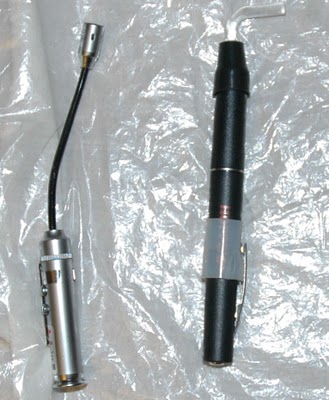
Look at the crown (the muzzle side
of the barrel). It should be symmetric and rifling next to the crown should be
present and not damaged. On some rifles you might find a condition called
"counterboring" - the rifling in the vicinity of the crown being removed. This
is done when the rofling at the muzzle is damaged. Stay away.
This is
what an acceptable crown should look like:
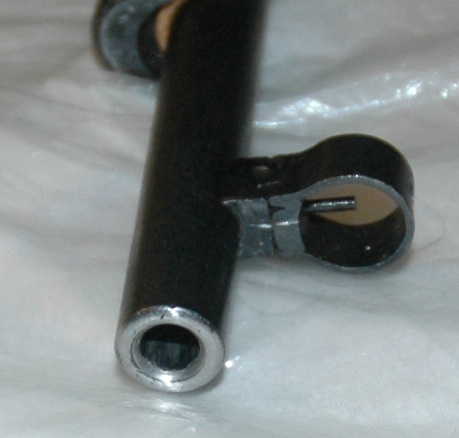
If the crown is not exactly round,
or there are chips or scratches on it, as the bullet is leaving the bore the gas
will exit around it unevenly and deflect the bullet.
A note about the gun shows...
Gun shows
can be great for running into a unique piece of antique weaponry by accident,
but they are not good at all for aquiring run of the mill guns. I've gone to
quite a few in the recent years, and the prices were atrociously high - a PSL
54c, for example, which can be had - new - for under $600 in most internet shops
would consistently go for $800 or more on a gun show. The prices on all other
guns - AKs ($600 for something that's $350 on the Internet), Garands ($800 for a
$500 gun), and, yes, Mosins, were similarly higher than on the Internet - or in
a retail store. Unfortunately I found the same to be true for everything
else - from reloading equipment to optics to components to ammunition, so I quit
going there a few months ago.
The best way to buy Mosin Nagants is on the
internet. This is where you get the best prices, and the widest selection. There
is one complication though: weapons cannot ship to an individual, they must
arrive at the licensed firearms dealer. So you have to go to a local gun shop,
pay them the transfer fee of around $40 (in Seattle area), and have the gun ship
to them instead of you.
Paying $50 for transfer and the shipping cost of
a $70 rifle is extremely painful (12/16/2011 Update: A recent law in WA state requires the dealers to
collect use taxes on the rifles transferred interstate. This includes the shipping cost.
http://dor.wa.gov/Content/GetAFormOrPublication/PublicationBySubject/TaxTopics/FirearmTransfers.aspx
FFL is on the hook for collecting the tax - if they fal to do it, they are liable
for the amount when state audits them. This means that you would actually be paying $60
in transaction costs on a $70 rifle), and there is a relatively easy way around it:
you can get a so-called C&R (collectables and relics) license that allows
individual gun collectors buy certain classes of weapons remotely and having
them shipped directly. Mosin Nagants, along with almost all other WWII
weapons, qualify as a C&R purchase.
The license costs $30 for 3
years, and pays for itself on the very first transaction. Furthermore, it allows
you to buy weapons and other gun-related at dealers-only prices at some
distributors. It allows certain other benefits, for example, being able to buy
guns though Civilian Marksmanship Program. I highly recommend getting
it.
The only disadvantage is that it takes quite a while (a couple of
months) to get. Even getting the form takes forever, since it arrives by snail
mail - there is no internet download. So start early.
Here is how to get
it.
Getting a C&R license
Go here: http://www.atf.gov/forms/dcof/index.htm.
Enter your name, email, the phone number (xxx-xxx-xxxx, the form checks this
format!) and the mailing address.
Then on the right side of the form
select "F 7CR (5310.16) - Application for License (Collector of Curios and
Relics) Under 18 U.S.C. Chapter 44, Firearms" and click the "Add" button above.
Get a couple of copies in case you spoil the first one. Click the Submit button
for the form.
Then wait. When you receive the form, fill it out (it is
not very complicated) and send it in.
When you get your license, make
several copies. Sign each copy individually (NOT the original), because you will
need to send copies with your original (not copied) signature to the internet
stores.
For reference, here's the best article on C&R license.
The links on it are obsolete, but the information is useful: http://www.surplusrifle.com/shooting2005/howtogetyourcurionrelicffl03/index.asp
Buying on the Internet
Now that you are
able to buy on the internet, the horizons are much wider. You are no longer
limited to what's available in the store, so - what should you buy?
As I
said previously, I would stay away from rifles made during the war.
Unfortunately, most of the internet stores do not allow you to pick a year of
manufacture. You can, however, - and I strongly recommend that you do - ensure
that the rifle was made before the war by buying one with a hex receiver - they
were not making guns with hex receivers during WWII.
This is an example of a hex action:
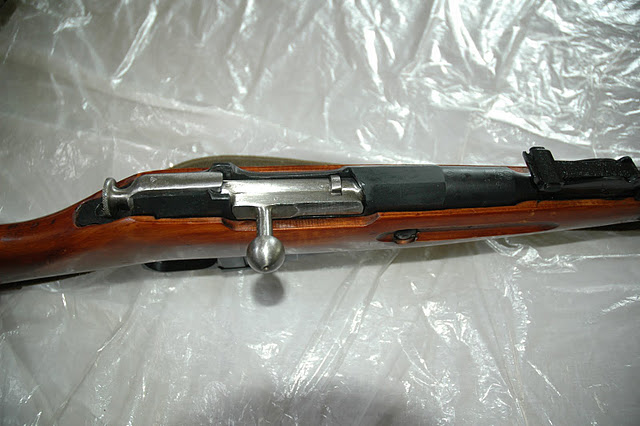
There are 3 basic choices of
manufacturers for Mosin Nagants - Tula, Izhevsk, and two factories in
Finland.
The differences between Tula and Izhevsk are not huge, although
Tula rifles are considered to be marginally better. I don't think the difference
is material.
Finn rifles are typically better quality, and shoot better,
but they are more expenisve than Russian (usually in $200-$300 range vs.
<$100), and the bore of many rifles made before 1939 is narrower - a proper
.308 caliber vs .311 that is the case with Russian guns. Which means that if you shoot any factory
7.62x54R ammo (surplus OR newer production) in them, you will have ruined the
rifle. Stay away from Finn rifles unless you know what you are
doing!
Finally, there are so-called "sniper" rifles that you will
frequently encounter on the 'Net. There are two types of them.
First, the
"ex-sniper" rifles with the scope rail removed, and the screws which were used
to attach it filled. The reason they are "ex" is because they no longer shoot
well enough to qualify as a sniper rifle, so I do not recommend buying
them.
Second, there are "sniper" rifles with the scope, in $400-$450
price range. Read the fine print - they are not really sniper rifles. They are
just regular Mosins with a reproduction WWII scope added to them recently. They
don't shoot any better than your average rifle, the scope rings only allow for
one particular scope - they do not support modern scopes - and that scope's
maximum magnification is only 2.5. That was good enough during the WWII, given
the infinite supply of the gun fodder, but not today. You can do far, far better
for the money.
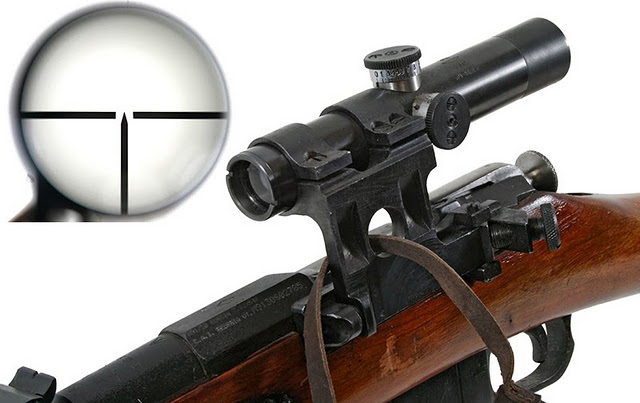
When a store offers you a choice of
hand selection for an extra fee, pay the fee, otherwise you will be getting the
rifle which the hand selection process have rejected. Most of the stores
pre-sort their rifles by quality, rather than really selecting them at the time
of shipping the order. For extra $10 you will ensure that your rifle is in the
top 10%.
One "disadvantage" of buying on the internet is that very likely
you will be getting a rifle with the numbers that either do not match, or the
numbers on the stock, the bolt, and the magazine were removed and a
cheap-looking electric pencil record was made instead to match the barrel. In my
opinion, this is OK since we will be modifying the rifle anyway. It would be a
shame to destroy a perfectly preserved specimen, whereas these rifles have
little to no historical value.
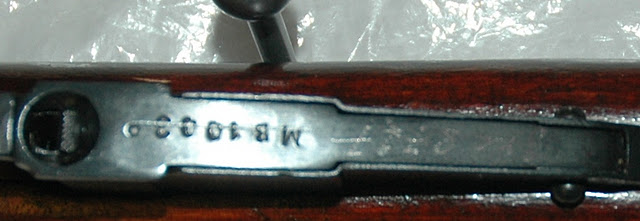
Here's a roundup of the best internet sources of Mosin Nagants.
J&G Sales, http://www.jgsales.com/.
This is by far the best place, because they offer, for an extra $30, hand selection
for the bore quality. This service is worth its cost and then some - the rifles I got from
them had absolutely perfect bores.
AIM Surplus http://www.aimsurplus.com.
I have not bought a "shooter" grade Mosin from them, but I've bought many other rifles
and pistols. All arrived in tip-top shape, better than described, and extremely fast.
AIM has fantastic reputation on the internet, probably the best of all online gun stores.
SOG International (AKA Southern Ohio Gun Distributors), http://southernohiogun.com/. They have
the cheapest rates, and the worst web site with no browse function. To look for
Mosin Nagants, search for MN. Because of the terrible website layout things that
would be gone in a day from other stores linger here, so you can occasionally
find a diamond in the rough, for the price of a cubic zirconia.
Century
Arms International, http://centuryarms.biz/. You have to have a
C&R to even see their prices, and the prices are not even that great. They
are the main importer of these rifles, everyone else merely distributes them,
and so you'd expect that the prices and the quality at the source is great, but
it's not. The one big advantage here is that shipping is free. They do
occasionally have sales where you can buy 5 rifles inexpensively.
Contents
- Introduction
- Buying
- Cleaning
- Disassembly
- Accurizing
- Selecting a scope mount
- Mounting a side rail
- At the range